EDI Central
-
Initiatives & Accomplishments
In fiscal 2021, the Office for Equity, Diversity and Inclusion offered several initiatives and programs aimed at fostering inclusion and equity on campus and community education, as well as promoting belonging and civil conversations across campus. Below are a number of key accomplishments in the 2021–22 academic year, alongside information from Vanderbilt identity centers and our direct campus partners:
- Collaborated with all vice chancellors and deans to develop individual EDI strategic plans for each division, college and school. The plans will play a key role in the development of an Institutional EDI Strategic Plan launching in January 2023.
- Launched four new employee affinity groups: Indigenous, International, Military and Veterans, and AAPI. EAGs are employee-led and facilitated groups formed around interests, backgrounds, identities and common bonds. Through participation in EAGs, Vanderbilt staff and faculty help foster a positive work environment at the university by actively contributing to its mission, values and efforts specific to diversity, inclusion and campus engagement. The primary goal of EAGs is to promote diversity, openness, understanding and inclusiveness. There are now 10 EAGs on campus, with up to four more launching each academic year through staff nominations and more to be launched in the upcoming academic year.
- Launched Churchwell Chats, a series of conversations between EDI leadership and members of the campus community, including faculty, staff and student leaders. The Office for EDI hosted seven sessions in the 2021-22 academic year, the feedback from which served as the catalyst for new initiatives in staff hiring, faculty retention, student accessibility efforts and more. These conversations also led to the development of a staff committee to assess and provide recommendations on supporting Black faculty, staff and students, led by Mia Clermont and Cassanora Lampley.
- Developed a Gender Affirmation Toolkit for employees and managers
- Worked with VUIT and other campus partners on the Chosen Name Project, which will allow students and most employees to use their chosen/preferred names across all university systems, including VU ID cards.
- Increased LGBTQIA+ demographic data collection in systems and surveys in collaboration with the Office of the Chancellor.
- Developed and launched a timeline of equity, diversity and inclusion efforts at Vanderbilt since its inception, as well as individual timelines for each college and school
- Developed a Graduate and Professional EDI Council, which consists of one student representative from each of the graduate and professional schools and meets quarterly with EDI leadership and Ashley Brown, director of the Student Center for Social Justice and Identity, to provide feedback to leadership and brainstorm solutions to challenges and share more about the graduate/professional student experience from an EDI perspective
- Developed EDI workshops for various offices, colleges and schools across campus. New courses include Toward a Culture of Inclusion at Vanderbilt, Navigating Unconscious Bias and Challenging Microaggressions, as well as 18 curated workshops. The Office for EDI also compiled a list of all trainings available to the Vanderbilt community through campus partners such as the Black Cultural Center, Center for Teaching, Office of LGBTQI Life, Student Center for Social Justice and Identity, and the Women’s Center.
- Enhanced the This Moment in America series, established in spring 2021. This series highlights the need for empathy and action to improve the experiences of marginalized groups in the U.S. Topics in the series have included: Insights for Equity and Inclusion in Turbulent Times (February 2021), Violence against Asian Americans and Asians through the Lens of History and Racial Justice (April 2021), How to Be an Ally and Its Meaning in a Time of Social Justice (November 2021).
- Offered special programming centered on education around racial equity, including Racial Justice, Freedom and Activism in Nashville and Beyond: Then and Now Symposium (March 2021) and 2022 Faculty Reflection on the Importance of Juneteenth, engaging more than 2,000 Vanderbilt community members.
- Enhanced communications among stakeholders and campus partners through increased transparency and information sharing.
- Launched four new identity initiatives: AAPI, IndigenousVU, MilitaryVU and VUGlobalCitizens and worked to stabilize the four existing identity initiatives (Network First-Gen, PersistVU, InclusAbility and SomosVU) through more programming and stronger collaborations. These identity initiatives collaborated with various campus partners to execute a total of more than 28 programs—a 76 percent increase in the number of programs.
- Collaborated with the Student Center for Social Justice and Identity to develop one new and sustain two of their identity-based graduate recognition ceremonies: Asian American and Pacific Islanders and Desi Americans, Native American and Indigenous and Latinx.
- Created three new graduate recognition ceremonies (MilitaryVU, VUGlobalCitizens and InclusAbility) and hosted three existing ceremonies for Network First Gen, PersistVU and the Posse Scholars Program.
- Hosted the seventh annual Diverse ’Dores Day with a new expanded format, which reached more than 900 people and collaborated with 10 campus partner offices. The event was launched in 2014.
Identity Centers
-
Bishop Joseph Johnson Black Cultural Center
Key accomplishments in 2021–22:
- Made significant upgrades to the facility with the completion of a courtyard renovation project and a technology upgrade in our seminar room and auditorium, which now allows us to reach an even greater virtual audience with our programs.
- Supported 188 programs as either the primary sponsor or as a secondary cosponsor that engaged more than 6,000 community members, including 50 percent of all Black students and 73 percent of all Black undergraduates on campus.
- Launched several signature programs that were well received by the Vanderbilt community, such as “Buy Black Vandy,” “Suit and Tie Awards” and “Hats Off to Women.”
- Experienced a significant increase in program participation by faculty and staff, which was largely fueled by growth of the Association of Vanderbilt Black Faculty and Staff. The lifetime membership rate for the AVBFS grew by 30 percent this year.
- Launched a new training module based on Black Student Development Theory.
- Finished in the Top 10 on the leaderboard for donations received on Giving Tuesday and on annual Giving Day.
- Raised more than $120,000 on the university’s annual Giving Day, which more than doubled our previous record.
-
Center for Spiritual and Religious Life
Key accomplishments in 2021–22:
- Developed a strategic plan for the center, in alignment with the EDI strategic plan, as well as a strategic plan for the Holocaust Lecture Series.
- Hosted Narrative 4 story exchanges for more than 460 students, faculty and staff across multiple departments and organizations.
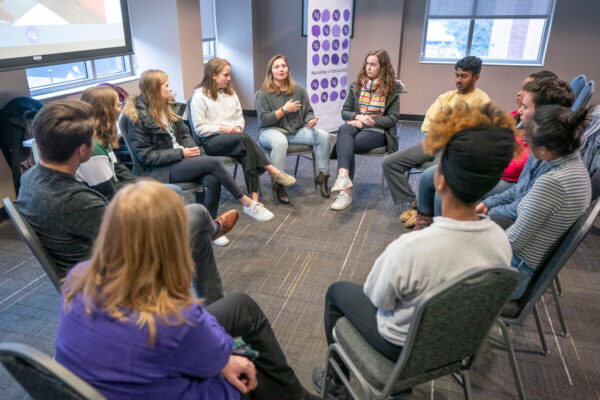
Students participating in a commemorative session hosted by the Center for Spiritual and Religious Life honoring Martin Luther King Jr. - Engaged in advocacy on campus for the religious needs of individuals and communities, which has led to cross-campus collaboration and fostered greater inclusion at Vanderbilt.
- Provided individual pastoral care, workshops and community gatherings such as Spiritual Healing Series, GriefNet and vigils in response to national crisis and community loss.
- Hosted “A Black Girl’s Community Care Network,” a womanist-led, community-based, small learning group focused on building communities of care among Black women and femmes to support each other in caring for mind, body and spirit. The group met biweekly to gather, share stories and engage in care practice workshops to practice care and healing for one another. ABCCN was a project led by the center’s Divinity School intern, Taqiyyah Elliott, and funded by a trans-institutional programs grant from the Office of the Provost.
- Hosted the 43rd annual Holocaust Lecture Series, focused on the theme “The Root of Hate: From Word and Images to Fear and Violence.” The series was established by the university’s first chaplain, the Rev. Beverly A. Asbury, in 1979 and has become the longest continuous lecture series on the Holocaust at an American university. Dedicated to reflection on ourselves and our society in the wake of the Holocaust, for more than 40 years HLS has brought notable scholars, survivors and liberators, and artistic examinations of the Holocaust, to Vanderbilt’s campus.
-
K.C. Potter Center/Office of LGBTQI Life
Key accomplishments in 2021–22:
- Welcomed new Director Stephanie Mahnke, as well as two full-time staff members, Assistant Director Yasja Hemmings and Program Coordinator Katja Tetzlaff.
- Developed a strategic plan for the center, in alignment with the EDI strategic plan.
- Provided in-person educational, social and wellness services for more than 900 students, faculty, staff and members of the wider Nashville community.
- Focused on serving the most vulnerable and underrepresented in our communities by reviewing climate assessments and emphasizing intersectional programming.
- Offered 16 workshops and presentations on gender, sex and sexuality diversity, engaging more than 240 community members.
Trainings included:- Straight Facts About LGBTQI Life
- Queer Teaching, Queer Thriving Learning Community with the Center for Teaching
- Introduction to the K.C. Potter Center
-
Margaret Cuninggim Women’s Center
Key accomplishments in 2021-22:
- Developed a strategic plan for the center, in alignment with the EDI strategic plan.
- Welcomed new staff: Assistant Director ReAnna Roby and Program Coordinator Sarah Brennan.
- Launched the Women’s Center Portrait Project, which offered an opportunity to recognize women whose stories are less visually present around campus. The project also supported local women artists while celebrating key women in Vanderbilt’s history.
- Partnered with Vanderbilt Athletics and Project Safe to offer a wide-ranging set of events and programs that recognized the 50th anniversary of Title IX.
- Offered and enhanced programs that engaged more than 1,500 members of the community. Programs included:
- Body Project
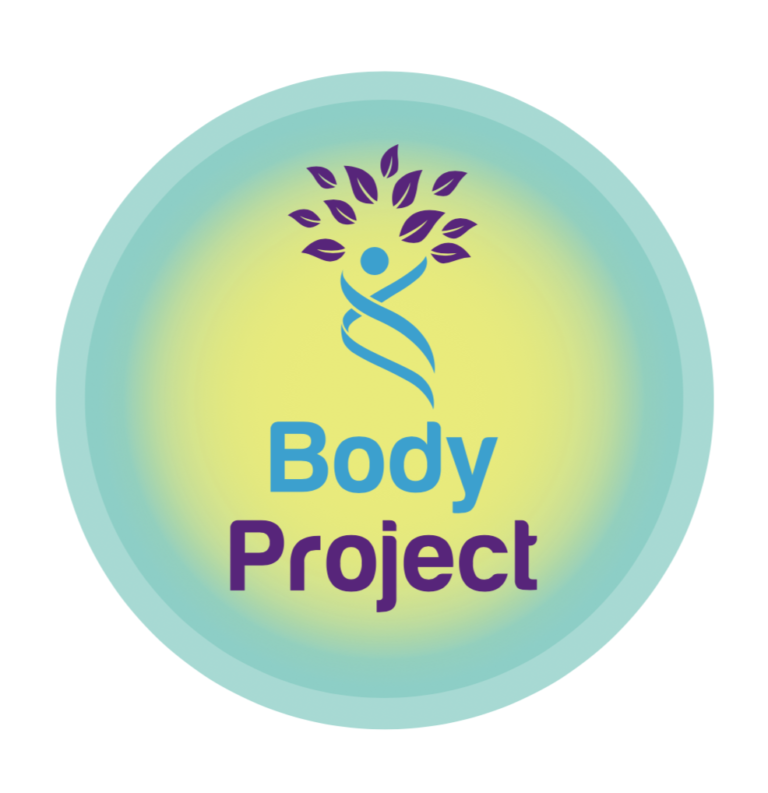
- Vandy Sex Ed
- Salary Negotiation Workshop
- Grown-ish: Skills for Life
- Inclusive Book Group, in collaboration with the Vanderbilt libraries, Robert Penn Warren Center for the Humanities, and Employee Learning and Engagement
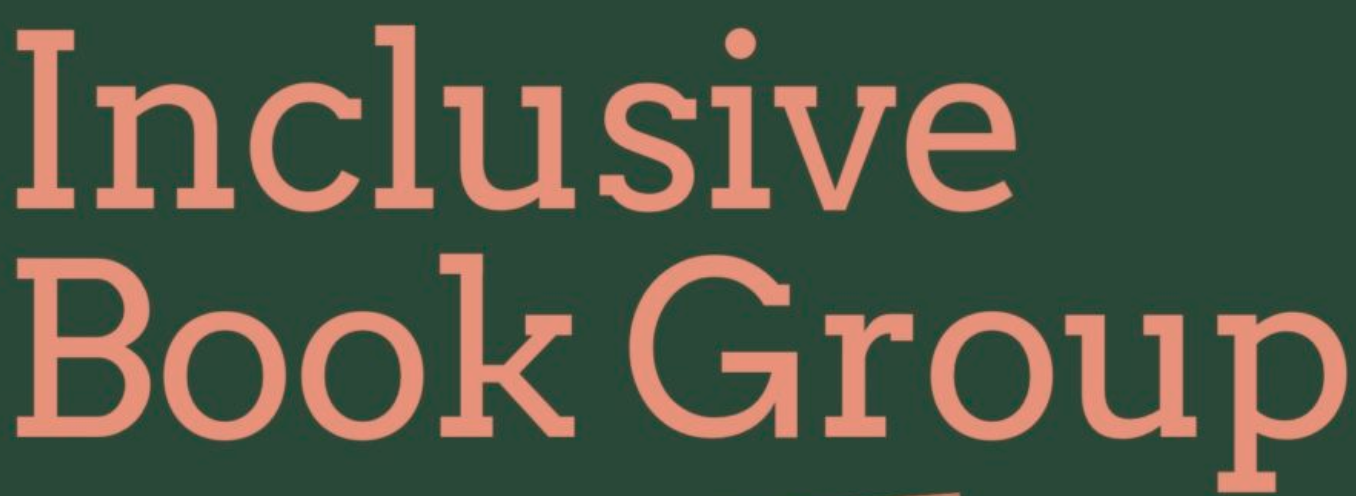
- Kitchen Table Series
- Parenting Group
- Women in the Academy
- Work-Life Workshops
- Body Project
- Collaborated with Intercultural Education and Outreach and the BCC on the first campuswide recognition of Ella Baker Day at Vanderbilt.
Campus Partners
-
Office of the Chancellor
The work of creating a more equitable and diverse community with a sense of belonging begins at the highest institutional level. The Vanderbilt Way, championed by Chancellor Daniel Diermeier, highlights core beliefs that individuals are inextricably linked to identity, which is the foundation for everything we say, do and build. These beliefs are manifested in all areas of the university throughout this report, beginning with the Office of the Chancellor:
- Belonging: Once you’re chosen, you belong.
Vanderbilt is extremely selective intentionally. Only people with the highest potential will make the cut. Once you’re here, you will be surrounded by the best and brightest, brought together for one simple purpose: to make each other better. - Self-direction: Choose your own path, and go all in.
We believe personal purpose can only be found through relentless exploration and challenge. If it’s too comfortable, you’re not doing it right. Experience as much as you can. And once you discover your path, give it everything you have. - Continual growth: We never stop growing and achieving.
A permanent growth mindset is more important than any single achievement, however big. Vanderbilt believes that human potential is realized over a lifetime, in increments and leaps, and it expands as you grow. - Radical collaboration: Teams challenge and support each other.
Our goal as a community is to work as one. We believe that by challenging and supporting one another, high-functioning teams are able to accomplish far more than individuals. And only by rallying around a common purpose can we truly multiply our individual potential.
The following are examples of the many campuswide initiatives that the Office of the Chancellor spearheads to lead the way in our diversity and inclusion efforts during the 2021-22 year:
- We strengthened our commitment to free expression at Vanderbilt, encouraging civil discourse and intellectual diversity. To provide the conditions necessary to fulfill our mission of transformative education and pathbreaking research, Vanderbilt must maintain a culture of free expression and open discourse in which all community members can freely discuss even the most challenging issues through respectful exchange and civil dialogue. Vanderbilt’s approach rests on two pillars: open forums and principled neutrality, remaining neutral on political matters at the institutional level, to leave space for a diversity of opinions and voices to flourish. Learn more about our value of free expression as articulated in Chancellor Diermeier’s Investiture Address.
- As a way of continuing the conversation around open inquiry and civil discourse, Chancellor Diermeier gave remarks on the history and current practice of free expression and open discourse in U.S. universities during a public hearing held by the Higher Education and Research Committee of the Danish Parliament, which is currently debating the importance of free expression in its universities.
- Chancellor Diermeier also participated in a conversation titled “The Path Forward for Academic Freedom in Higher Ed” as part of the Aspen Ideas Festival.
- We continued our support of the Vanderbilt Project on Unity & American Democracy, which aims to elevate the role of research and evidence-based reasoning into the national conversation on themes such as polarization, American progress, racial equality, religion, strengthening democratic principles, information technology and data, and artistic expression.
- We hosted the Vanderbilt Summit on Modern Conflict and Emerging Threats, which brought together internationally recognized leaders and experts in the military and intelligence community to examine cyber conflict, artificial intelligence, peer competition and emerging threats.
- We launched a campuswide initiative to enhance our support of active and veteran military service members within our university and broader community in partnership with Army and Navy ROTC, Army Futures Command, the Bass Military Scholars Program for graduate and professional students, the DOD SkillBridge Fellowship Program and programs welcoming and supporting veteran employees and their families.
- Belonging: Once you’re chosen, you belong.
-
Student Center for Social Justice and Identity
Key accomplishments in 2021-22:
- Offered trainings to students, resulting in more than 4,600 interactions. Trainings covered topics such as social justice, intercultural competency and unconscious bias, as well as custom trainings.
- Hosted IgniteVU, a yearlong engagement of Greek student leaders learning intercultural competency. Aimed at education, community building and connection among the Greek community, the program resulted in increased Greek student engagement on these topics and served as an important start to having bold conversations within the Greek community.
- Hosted the first annual Empowerment Summit, a daylong conference for students to explore a social issue and/or marginalized culture to expand their knowledge and empower the voices of marginalized community members. The event was a collaboration of SCSJI and student organizations, including Hidden ’Dores and the Vanderbilt NAACP.
- Offered training in Restorative Practices, an emerging social science focused on strengthening relationships between individuals as well as social connections within communities. SCSJI offered two-day workshops, training 37 staff members in using effective statements, questions and circles.
-
Human Resources
Key accomplishments in 2021-22:
- Enhanced recruitment of new staff, including implementing mandatory diversity recruitment training and certification for recruitment team, as well as partnering with historically Black colleges and universities for recruitment.
- Increased the university's minimum rate of pay to $16.50 an hour for regular full-time employees. Negotiated a new collective bargaining agreement that substantially increased the rate of pay of the university’s lowest-paid employees (mostly POC), while also providing growth opportunities through new classifications.
- Updated the Employee Education Assistance Program to remove the barrier of the employee paying up-front tuition costs in the employee tuition benefit program. The university now provides the tuition payment after the employee registers for the class, which allows employees with fewer economic resources the same access to classes.
- Launched Vanderbilt’s first TedX Women, which recognizes the pandemic’s disproportionate impact on women by featuring women speakers who are imagining new possibilities and exploring new ideas for how we might live and work together for years.
- Created and presented EDI-related professional development courses (Uniquely You at Work: A Micro-Learning Series, #IamRemarkable, which focuses on helping women and other underrepresented groups learn how to practice self-advocacy in the workplace, Conversation Circle: Managing Employees at Different Career Stages, Virtual Thought Leader Series: Neurodiversity at Work (with Dr. Dave Caudel, the Frist Center for Autism and Innovation), Virtual Thought Leader Series: Do I Belong Here? Recognizing and Overcoming the Imposter Syndrome (with Dr. Maureen Gannon, VUMC).
- Partnered with Government and Community Relations to lead a session in the Community Engagement Forum to discuss Rethinking Work and the Workplace.
-
Equal Opportunity and Access
Key accomplishments in 2021-22:
- Expanded to include a reasonable accommodation manager serving as the central point of contact for requests for religious accommodations and for faculty and staff disability accommodations. The addition of this position allowed EOA to enhance its collaboration with campus partners to respond to requests for accommodation, including working with Campus Dining and the Student Center for Social Justice and Identity to address accommodations for observance of Ramadan/Eid-al-Fitr during final examinations; conferring with Dining Services to identify diet-specific dining options; and partnering with OHARE to provide housing accommodations.
- In collaboration with the Office of the Chancellor, Student Access renovated space in the Sarratt Student Center for a new Student Access Office in the center of campus, which provides accessible testing space and study space for students with disabilities at Vanderbilt.
-
Center for Teaching
Key accomplishments in 2021-22:
- The theme of the 2021–22 annual “Teaching, Difference and Power” learning community, a series that dates from 2014, was “Queer Teaching, Queer Thriving.” The group was co‐hosted with the KC Potter Center for LGBTQI Life to help faculty and staff better support the needs of LGBTQI+ students. A total of 30 participants discussed topics such as inclusive teaching, queer pedagogy, student mental health and faculty well-being.
- Hosted the second annual Course Design Institute on inclusive teaching, a four‐day event delving into the scholarship on inclusive teaching and application into faculty course design work.
- Partnered with faculty to develop and host learning communities exploring aspects of inclusive pedagogy. These efforts include partnerships with Civil and Environmental Engineering on high impact and inclusive teaching practices, with a new employee affinity group on anti‐racist teaching and with faculty from Peabody College on culturally responsive teaching.
Vice Chancellor Divisions
-
Division of Administration
Divisionwide
- Departments within the Division of Administration are partnering with The Precisionists Inc., which bridges the divide between jobs and the talent pool of people with a broad range of disabilities (those on the autism spectrum, disabled veterans, hearing impaired and visually impaired).
- Facilities has started its second year with TPI and currently has one individual employed as a custodian and is also serving as point for the division to expand this opportunity.
- In 2022–23, Auxiliary Services is partnering with TPI to provide internships in Mail Services and Printing Services, and Vanderbilt University Public Safety has discussed with the group the potential to offer positions to members of the organization. Learn more about what TPI does and how they do it at their website: theprecisionists.com.
- Increased the Acorn School Scholarship tiers to support employee accessibility:
- 50 percent tuition discount for families making less than $50,000
- 20 percent tuition discount for families making between $50,000 and $75,000 annually
- 7 percent tuition discount for families making between $75,000 and $100,000 annually
Campus Dining
- Partnered with the Tennessee Board of Regents to develop a workforce development program with Nashville State Community College, including a culinary training course for dining staff and 20-hour enrichment program for culinary staff.
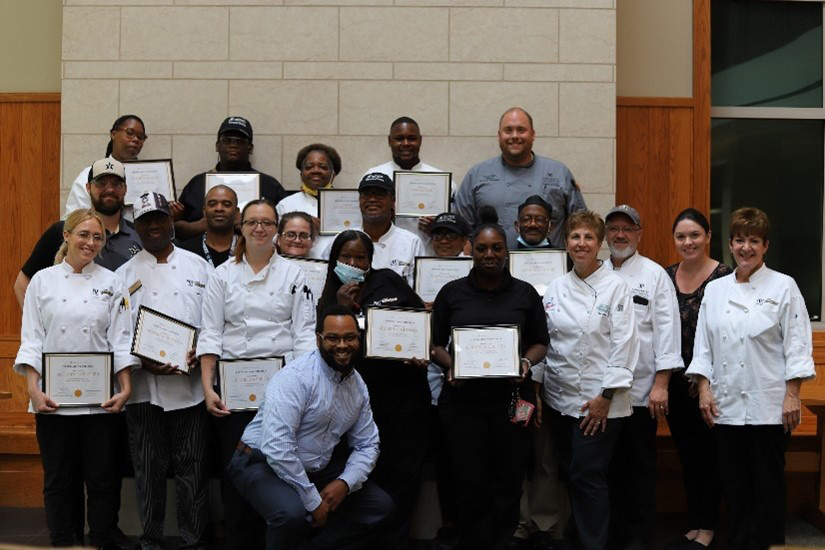
- Created two new union classifications to provide a pathway for hourly team members to grow in the organization and develop professionally. Frontline employees in these roles will acquire the training and skills needed to be successful in management positions. Twelve hourly team members were promoted into these roles for fall 2022.
Vanderbilt Child and Family Center
- Announced that The Acorn School now accepts State of Tennessee DHS vouchers for families that qualify.
- Began a pilot registered Early Childhood Education apprenticeship for individuals with cognitive differences in partnership with Next Steps at Vanderbilt, the first of its kind in Tennessee. Students enrolled through Next Steps work toward earning a U.S. Department of Labor industry-recognized credential by embedding for training in an ECE classroom with an assigned mentor teacher through VCFC’s The Acorn School.
Facilities
- Increased supplier diversity on campus. The Facilities Campus Planning and Construction office worked with Purchasing to develop a policy and procedure process, including development of specific templates, to create a robust and proactive expectation for greater employment of diverse contractor and subcontractor companies. Campus Planning has worked with Purchasing to now include the EDI policy and procedure initiative into all Construction Manager RFQ and RFPs. The CPC process and documentation can be found under “Diversity Tracking” here: https://www.vanderbilt.edu/campusplanning/contractor-resources/
- Vanderbilt University Real Estate has asked third-party management companies (1) to assess our minority/women-owned business enterprises spend and (2) to source suppliers to expand that spend. This was added as part of their key performance indicators this year. VURE is tasking staff to track efforts to obtain current data for reporting next year.
- Working with Procurement, all departments in Facilities have been much clearer about minority/women-owned business enterprises and EDI in their RFPs/RFQs, including consideration of project leads and the composition of support staff and subconsultants.
- Continued training offerings within the organization, especially to address equity, diversity and inclusiveness, including new Oracle Learn courses Facilities 22: Diversity in the Workplace and Facilities 22: Workplace Diversity-Becoming a DEI Ally and Agent for Change.
Transportation and Mobility
- Collaborated with Walk Bike Nashville to map pedestrian fatalities along Nashville streets in 2021 as part of Vision Zero.
- Continued to coordinate WeGo Public Transit Forums to gain feedback on route and service changes related to the city’s public transit system.
- Offered a new sustainable commute incentive as part of the Daily Parking Program, which can be earned by using transit, carpools, vanpools, walks or bikes, thus reducing our greenhouse gas emissions and supporting other forms of transportation.
- Collaborated with Facilities to meet with planners and engineers from TDOT and NDOT to perform a walking audit as part of TDOT’s Pedestrian Road Safety Initiative on Broadway/21st Avenue between 19th Avenue and Pierce Avenue, helping identify potential short-term improvements to pedestrian safety through regular maintenance and safety program funds.
Vanderbilt University Public Safety
- VUPS continues to meet with the CORE Committee, which includes stakeholders across the entire Vanderbilt community, including student government.
- The implementation of the Captains Program significantly increased the diversity, equity and inclusion throughout exempt command staff levels in regard to race and gender. The Captains program serves as an upward momentum opportunity for leaders to develop through mentorship and training from majors, directors, deputy chief and chief to someday fill roles when available.
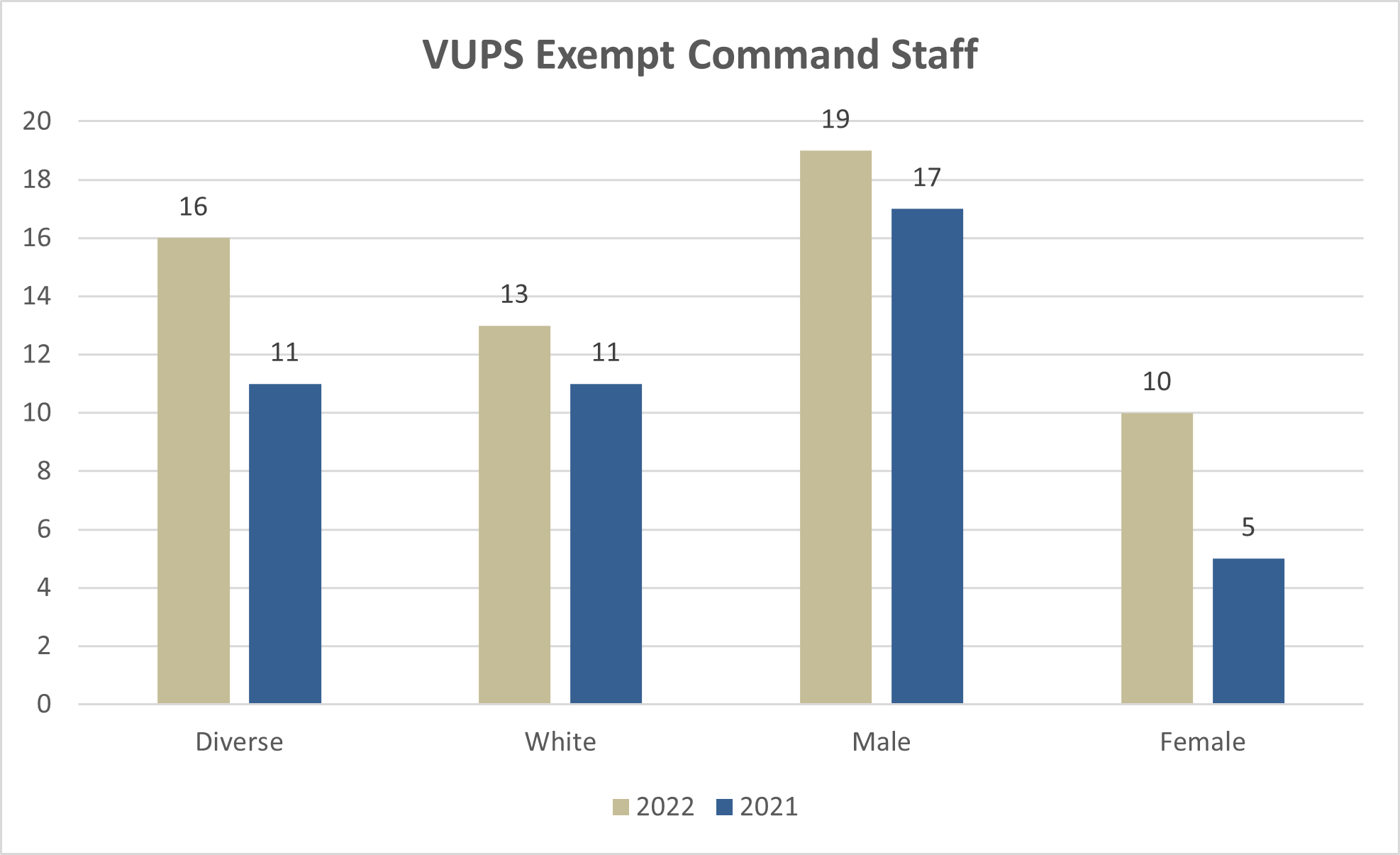
- Pending approvals from campus administration, VUPS intends to implement a body-worn cameras program to support transparency and help ensure accountability and equity. The program is pending final approval from VU administration.
- The Public Safety AmbassaDore program continues to enhance efforts to engage with the Vanderbilt and Nashville communities and provide the highest quality customer service to campus.
-
Vice Provost for Academic Affairs
- Army ROTC
- Welcomed 1st Lt. Jarrod Jones as representative of the Army’s ROTC Patton Program, which increased diversity in the officer corps by placing highly qualified armor and infantry first lieutenants as cadre within ROTC programs at, or with cross-enrolled students from, historically Black colleges and universities. Patton lieutenants conduct outreach and mentorship with students with the goal of increasing minority entrances into the infantry and armor branches upon commissioning.
- Global Education Office
- Began partnering with the Council on International Educational Exchange to offer Vanderbilt students the opportunity to apply for the Frederick Douglass Global Fellowship, a highly competitive leadership program that gives students the opportunity to spend four weeks abroad exploring conflict and injustice from various perspectives and the leaders who sought to effect positive change for their communities.
- Offered several new sessions in the Study Abroad Voices series, where panels of returned study abroad students reflect on their experiences, including Study Abroad as an Asian American, Study Abroad as an International Student and Study Abroad and Financial Inclusivity.
- Offered a new Financing Study Abroad session to highlight the supports available to students.
- Began recruiting students for a study abroad program in Colombia, in which students study race, identity and ethnicity through the Afro-Colombian lens and, in particular, a field-informed course on the history and modern practice of coffee production that was co-developed with the Center for Latin American, Caribbean and Latinx Studies, the Wond’ry and external partner CET Educational Programs.
- Global Safety and Security
- Rebuilt the structure of pre-departure orientations and pre-departure consultations for students with a special focus on supporting students of color and those with identity-based challenges.
- Recruited a team member whose focus is expanding access and equity for all student travelers.
- Initiated conversations with academic leadership on how to provide enhanced training for faculty-led experiences.
- Added a community-based component to site assessments to inquire what supports exist for our students of color and how Vanderbilt can supplement those supports.
- Naval ROTC
- Developed and launched a comprehensive engagement strategy with TSU to recruit and develop a more diverse naval officer corps that reflects the sailors and marines we lead and the nation we serve.
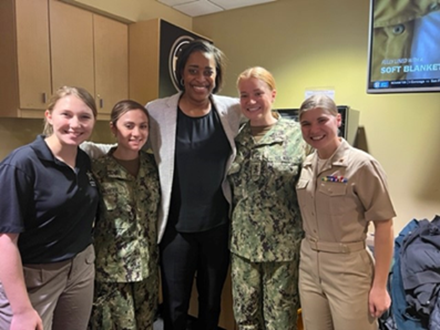
Members of Vanderbilt ROTC stand with Athletic Director Candice Lee. Lee is also vice chancellor for athletics and university affairs.
- Developed and launched a comprehensive engagement strategy with TSU to recruit and develop a more diverse naval officer corps that reflects the sailors and marines we lead and the nation we serve.
- Office of Experiential Learning and Immersion Vanderbilt
- Hosted a series of events and programs that furthered conversations on EDI:
- Community engagement event with partners Hands On Nashville and the Center for Nonprofit Management to highlight ways undergraduate students can use experiential learning to not only fulfill a graduation requirement but also to support our Nashville community.
- Vanderbilt Undergraduate Research Fair with opening remarks by Samar Ali titled, “Diverse Paths, Diverse Opportunities: Creating a Future with a Foundation of Research.”
- Nichols Humanitarian Fund Open House to highlight humanitarian opportunities available to students during their summer break.
- VUSRP application workshop for potential applicants; the goal is to provide support and guidance for students unfamiliar with an application process that focuses on research.
- Explorations in Research with keynote speaker Marcy Singer-Gabella; remarks discussed work that brings together diverse stakeholders to investigate and act on pressing problems that contribute to inequality.
- Hosted a series of events and programs that furthered conversations on EDI:
- Residential Colleges
- The Ingram Commons
- The Commons' programming targeted issues of diversity and inclusion through small-scale programs that included dinners, field trips to Nashville sites and lectures. The 2021–22 Dean’s Dinner series focused on the theme “Telling Your Stories” and invited scholars who represented a range of experiences and perspectives across campus.
- Hosted a field trip series that brought Commons students to events that prompted exploration and discussion, including a visit to the historic Ryman Auditorium for a performance from the Fisk Jubilee Singers and a trip to TPAC to see What the Constitution Means to Me.
- The Commons Lecture Series brings scholars to campus who invite consideration of issues of diversity, equity and inclusion.
- The Murray Lecture and the Crawford Lecture focused on issues of diversity, equity and inclusion:
- Murray Lecture with LaWanda Ward titled “Make it Make Sense: Racial Justice, Spirituality and Law”
- Crawford Lecture with Sarah Smarsh titled “Consider Class: Socioeconomics as an Aspect of Diversity”
- The Ingram Commons
- Upper-Division Residential Colleges Programming
- The four upper-division residential colleges offered small-scale, faculty-driven programs to address diversity and inclusion with students. These were most often in the form of a faculty-led dinner with a small group of students and a special faculty guest. Some examples of these programs include:
- Warren College hosted monthly salons in alignment with celebrations of different identity groups, including salons on LGBTQI History Month, Native American Heritage Month, Black History Month and Women’s History Month.
- Bronson Ingram College hosted monthly faculty teas, bringing in special guests, including Professor Hideko Shimizu for a traditional Japanese Tea Ceremony and the Robert Penn Warren Center Environments Graduate Student Fellows for a discussion of Jesmyn Ward’s Salvage the Bones.
- The four upper-division residential colleges offered small-scale, faculty-driven programs to address diversity and inclusion with students. These were most often in the form of a faculty-led dinner with a small group of students and a special faculty guest. Some examples of these programs include:
- Upper-Division Residential Colleges Programming
- Undergraduate Business Minor Program
- Hosted a wide range of speakers in our classrooms to work with students and provide them with insights and perspective, including:
- Akbar Ahmed, chair of Islamic studies at American University
- Gwen Sykes, the first Black female CFO of the U.S. Secret Service
- Deb Bial, founder and president of Posse Foundation
- Kolby Altman, president of basketball operations for the Cleveland Cavaliers
- Hosted events and sponsored student groups’ efforts to expose students to a diverse range of business professionals, including:
- A dinner for Ken Natori, president of Natori Co.
- Women in Business annual speaker Suzanne Gauron, managing director of Launch with GS, a Goldman Sachs program focused on lifting under-represented entrepreneurs and investors
- Hosted a wide range of speakers in our classrooms to work with students and provide them with insights and perspective, including:
- Writing Studio and Tutoring Services
- Collaborated with the Transitions Summer Catalyst program to familiarize its student leaders and participants with the resources available through the Writing Studio and Tutoring Services.
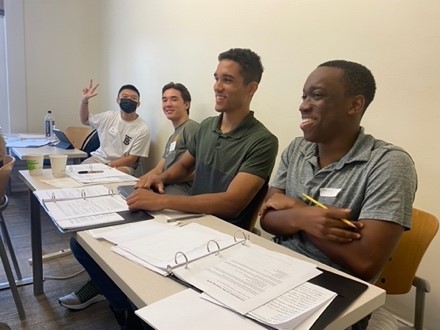
- Partnered with the BCC to provide a Virtual Resource Room.
- Continued to partner with the FirstVU student organization to offer a weekly General Chemistry Roundtable group for its members.
- Met regularly to discuss selected scholarly articles intended to inform a redesign of our August trainings for writing consultants and STEM tutors in a manner that centers EDI.
- Added works to the summer reading assigned to incoming writing consultants and STEM tutors to address the needs of an increasingly diverse student population.
- Collaborated with the Transitions Summer Catalyst program to familiarize its student leaders and participants with the resources available through the Writing Studio and Tutoring Services.
- Jean and Alexander Heard Libraries
- Identified and applied technological solutions that expand access to users with disabilities, including updating web accessibility standards on all library websites, providing access to screen readers and more.
- Reduced financial barriers for students by preferencing multi-user access models, preferencing DRM-free resources, working with small streaming providers without hosting capabilities to license and support classes by hosting locally, and identifying and activating open access and open educational resources for library search.
- Vigorously pursued policies and strategies that center a user-driven pursuit of EDI knowledge, including hosting conversations on acquiring or expanding research collections supporting EDI interest and need, and adopting model accessibility language in electronic resource licenses that vendors comply with the Americans with Disabilities Act and web accessibility guidelines.
- Law librarians Clanitra Nejdl, Mariah Ford and Katie Hanschke created a diversity and racial justice research guide.
- Focused several Buchanan Library Fellowships on EDI-related topics. These fellowships are a great way to provide international students and students from diverse backgrounds with experiential learning and undergraduate research opportunities, which are high-impact practices.
- Army ROTC
-
Vice Provost for Faculty Affairs
- Supported the practical aspects of the chancellor’s and provost’s $100 million Destination Vanderbilt recruiting initiative. Intended to enhance the excellence of our faculty in focused areas by leveraging our strong academic reputation and resilient financial position, our hiring rate more than doubled this past fiscal year. All the while, the institution maintained a recruiting success rate of better than 70 percent, with the Destination Vanderbilt Initiative’s recruiting success rate coming in at 73 percent.
- Established a social media presence by launching @VUFaculty to connect with, educate and amplify the work of our VU faculty, especially to highlight diverse faculty members.
- Developed and facilitated 15 Inclusive Faculty Search Committee workshops on group decision-making and the inclusive faculty search to guide faculty search committees in inclusive recruiting and hiring practices, reaching more than 170 faculty across six colleges and schools, as well as facilitating two dean search committee sessions.
New Faculty Hires 2015-16 2016-17 2017-18 2018-19 2019-20 2020-2021 2021-2022 Offers Made 50 42 62 58 50 64 109 Offers Accepted 29 34 44 35 33 47 74 % Women 49% 58% 53% 64% 45% 55% 52% % Faculty/Of Color
(African American, Hispanic, Native American, Asians, International of color and 2 or more races)41% 33% 38% 36% 52% 36% 51% % URM
(African American, Hispanic and Native American)35% 29% 24% 14% 36% 15% 24% -
Office of the Vice Provost for Research and Innovation
Below are EDI highlights advanced in the 2021–22 fiscal year through the Office of the Vice Provost for Research and Innovation, focusing specifically on the exemplary work of the Wond’ry team:
- Design Studio for Quantum Computing. The Wond’ry is working with Tennessee State and Fisk universities (both HBCUs in Nashville) and quantum companies DWave and Zapata Computing to provide a two-year training program for undergraduates in quantum computing. In addition to being one of the only programs in the world to prepare undergraduates for careers in quantum computing, another primary goal of this program is to diversify the quantum industry as it begins by focusing on inclusive innovation among VU, Fisk and TSU. To gauge interest and generate excitement, the Wond’ry hosted a Quantum Computing Workshop series in spring 2022 that attracted more than 93 students from Fisk University and Vanderbilt University to learn about the basics of quantum computing. The two sessions involved IBM guest speakers, who addressed the participants about topics such as Introduction to Quantum Computing (Session 1: March 23, 2022) and Career Opportunities in Quantum Computing (Session 2: March 30, 2022).
- Experiment to Enterprise Program. In April 2022, the Wond’ry partnered with eight universities from across the Midsouth to offer the Experiment to Enterprise program. This program was designed to show scientific students how they could turn their academic thesis work into a business/commercialization thesis. The program included a mandatory session introducing Lean concepts and a two-minute presentation on how teams can transform their research thesis into a business thesis for customer discovery testing. Strong teams were awarded a “Thesis Commercialization Enhancement grant” ($500 from the Wond’ry’s NSF I-Corps Site microgrant budget) and an opportunity to attend a regional entrepreneurial training program. The program had 21 teams apply from six universities. The cohort included first-generation college students and students with disabilities.
- Tikkun Olam Makers Makeathon. This annual event hosted at the Wond’ry pairs makers from Vanderbilt and the surrounding community with need-knowers (individuals with disabilities) to design solutions for everyday challenges. The solutions developed over the weekend makeathon are provided open source. Families of children with disabilities have traveled from as far away as Hawaii to participate. Some examples of past projects are a guitar pick holder for a student born without part of his hand to a tray adaptation for a walker to allow the need-knower to carry her lunch independently in the school’s cafeteria.
- Ideator, Builder, Founder Entrepreneurship Training Programs. The Wond’ry opened our entrepreneurial programming to all university-affiliated people from institutions of higher education in the region, including all the HBCUs in Nashville. This work has continued, and we’ve now had participants from community colleges, HBCUs and state universities. One of the highlights has been the team from Meharry Medical College that was the first team to ever get into I-Corps from Meharry after their participation in our programming. The entrepreneurship programs at the Wond’ry saw over a 130 percent growth in the number of applications over FY22.
- Renaissance Women’s Summit. The Wond’ry hosted the RWS in February 2022. The focus of this daylong summit was to provide educational opportunities for female entrepreneurs—no matter the stage of their venture. The event covered all aspects of growing or starting a venture, with an emphasis on storytelling and marketing; from social media and influencer marketing to branding, accounting and legal matters, hiring, management, operations and more. The event sold out, and a second event has been planned for February 2023.
-
Vice Provost for Student Affairs
- Divisionwide
- Hosted the workshop Amplifying Belongingness Through Supporting Diverse Students, which was designed to educate staff members on supporting students with historically marginalized identities.
- Opened the Multicultural Community Space in the West End Neighborhood. The space was created for the student members of the more than 30 student organizations that are part of the Multicultural Leadership Council or are supported and advised by the Student Center for Social Justice and Identity.
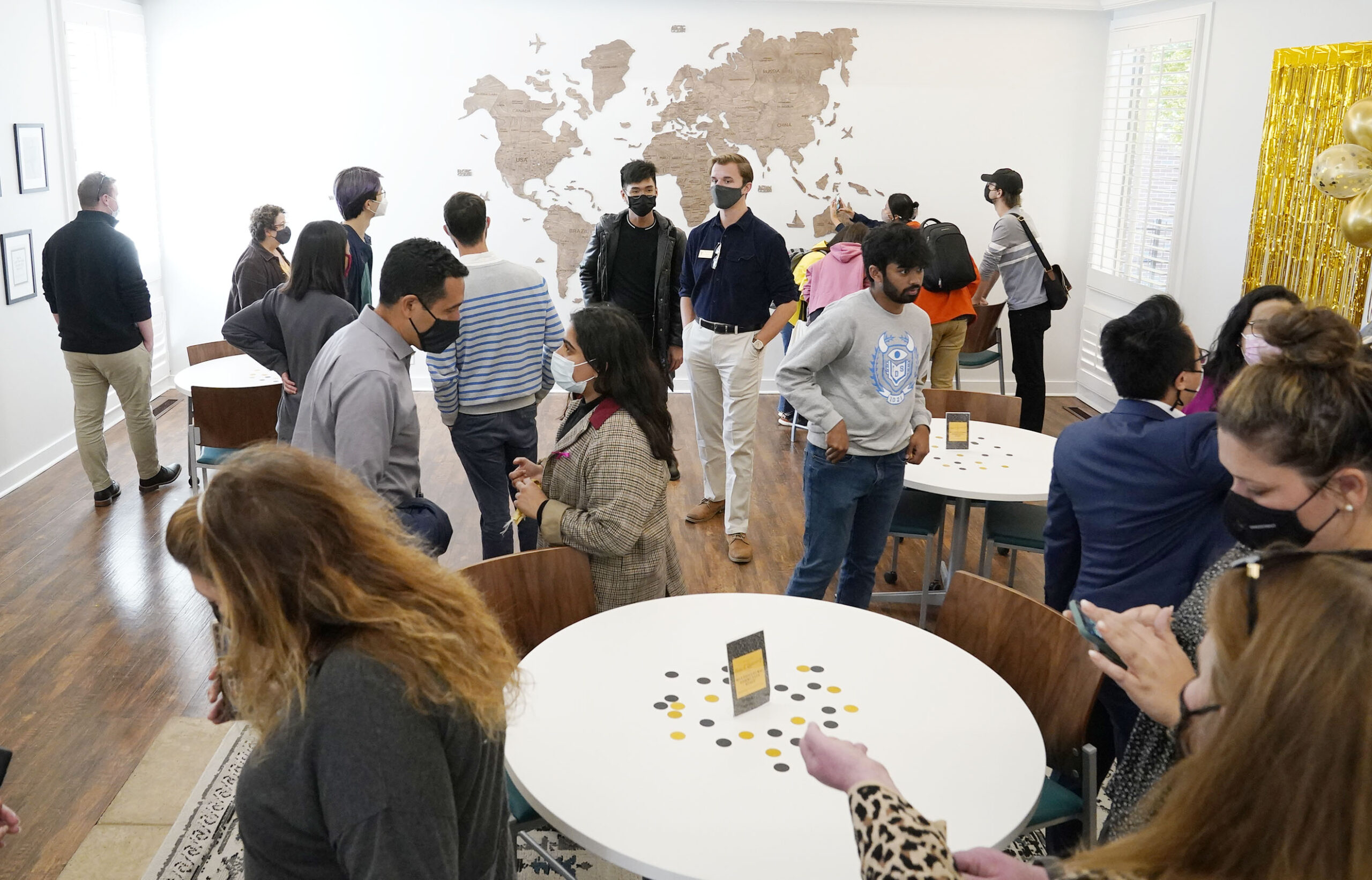 Students participating an in event in the new Multicultural Community space.
Students participating an in event in the new Multicultural Community space. - Project Safe engaged in intentional outreach, given that sexual harassment and assault disproportionately affect women of color, bisexual and trans persons.
- Student Accountability, Community Standards and Academic Integrity and the Center for Student Wellbeing collaborated with International Student and Scholar Services and the English Language Center on the International Student Ad Hoc Academic Working Group, a group created to advocate for current and incoming international student education on core academic issues.
- Greek Life
- Greek Life and the Intercultural Greek Council welcomed Alpha Psi Lambda, the nation’s first and largest coed Latinx fraternity, to campus.
- SCSJI and Greek Life collaborated to launch IgniteVU, a yearlong program designed to develop intercultural competence within the Greek community. The program involved participation in a kickoff session, completion of the Intercultural Development Inventory, development of chapter development plans, engagement in cultural activities and attendance at four SCSJI core sessions that educate participants about social justice issues and teach skills for communicating across difference. The IDI was completed by 92 percent of Greek members and leaders, and all 24 Greek organizations participated in feedback sessions.
- The Student Care Network
- The Student Care Network, including the University Counseling Center, Student Care Coordination and the Center for Student Wellbeing, expanded outreach, educational programming and services to better support Vanderbilt’s diverse student population.
- The SCN enhanced recruiting tactics to diversify staff, particularly around APIDA identities. The UCC hired staff to fill three new social justice and inclusion counselor positions, bringing more expansive representation of race/ethnicity, gender identity, sexual orientation and languages spoken to the UCC.
- Divisionwide
-
Vice Provost for Career Advancement and Engagement
- Career Center
- Implemented Interstride, an interactive portal to support international students in their internship/job search, immigration journey and community building.
- Piloted DRIVE (Diverse, Relevant and Inclusive Ventures and Experiences), a biannual newsletter with relevant professional opportunities, programs, resources and student spotlights.
- Adopted the NACE EDI Checklist for career centers.
- Initiated a relationship with The Diversity Org, a mentorship/talent pipeline nonprofit that seeks to connect underrepresented college students with mentors and opportunities in the corporate sector.
- As a result of that relationship, created “Identity-Based Resource Database” with more than 90 internship, research and fellowship/scholarship offerings specifically for underrepresented students.
- Identified and collaborated with more than 50 identity-based student organizations, including Organization of Black Graduate and Professional Students, Out in Engineering, National Society of Black Engineers, Society of Hispanic Professional Engineers, Society of Women Engineers and more.
- Health Professions Advisory Office
- Hosted events and programs focused on issues of diversity, equity and inclusion:
- Staying the Course in Medicine Dialogues
- Questbridge Panel
- Instagram takeover about Premed Wellness
- Re-established the Minority Association of PreHealth Students, including kickoff event with Vice Chancellor for Equity, Diversity and Inclusion André Churchwell.
- Collaborated with VUMC Office of Graduate Medical Education, House Staff Diversity and Inclusion Alliance and VUSM Dean of Students Office.
- Increased the number of Black or African American students from Vanderbilt applying to medical school to 45, putting Vanderbilt in the top five of the top 20 institutions in terms of numbers of Black and African American applicants to medical school and overall top six in percentage of Black and African American applicants compared to the overall pool at each institution.
- Hosted events and programs focused on issues of diversity, equity and inclusion:
- Career Center
-
Athletics
- Collaborated with the Women’s Center and other campus partners on a yearlong celebration of the 50th anniversary of Title IX. Highlights include ongoing coverage on VUCommodores.com; partnership with Chancellor’s Lecture Series on conversation between Candice Lee and the legendary Billie Jean King; screening and discussion of the HBO documentary LFG on the U.S. women’s national soccer team’s fight for pay equity; Title IX celebrations at lacrosse and baseball games; honoring of Title IX trailblazers Teresa Lawrence Phillips and Sharon Shields at SEC women’s basketball tournament in Nashville.
- Recognition and reconciliation with Black football pioneers of the 1970s during Georgia football game and Pioneer Weekend activities, as well as permanent input on Hall of Fame inductions.
- Partnership with Tennessee State University men’s basketball on joint “Pro Day” activities.
- New emphasis on support of Indigenous students and community.
- Native American Heritage Month webinar featuring leaders in Indigenous athletics and media
- Sponsorship of campus appearance by Pulitzer Prize–winning Native American poet Natalie Diaz
- Ongoing dialogue with Indigenous Student Organization
Celebrating our shared history with Pearl High School by celebrating Pearl’s influence on Vanderbilt and 1963 NCAA men’s basketball champion Loyola University (Chicago) when Loyola played at Vanderbilt this year; support of the Pearl High School museum at MLK Magnet School.
- Increased support of LGBTQIA+ athletes in the form of improved Athlete Ally Equality Index score to 85, (the highest in the SEC), staff participation in P.R.I.D.E. Training and hosting PRIDE Night for women’s basketball.
- Formed the Athletic Department EDI Committee, which celebrated Black History Month, and launched a series of videos on “unsung heroes” of the athletic department, among other initiatives.
- Supported student-athlete and staff affinity groups and conferences, such as the Black Student Athlete Group alumni panel and Student-Athlete Advisory Committee presentation.
- Created the Maggie Corbin Minority Baseball Apprenticeship, which provides the opportunity to increase the pipeline of minority coaches in the profession.
- Hosted civil rights trips for student-athletes: baseball team visited the Equal Justice Initiative Museum in Montgomery, Alabama; football visited the Civil Rights Room and Votes for Women Room at the Nashville Public Library.
-
Development and Alumni Relations
- Co-sponsored the Real-Talk Conference hosted by Black Vanderbilt with support from the Vanderbilt Alumni Association and Association of Vanderbilt Black Alumni. Sessions focused on personal and career development and leveraged recent alumni leaders working in a variety of industries to share insight, provide support and facilitate conversation with current students.
- Fostered a greater sense of belonging among diverse alumni across the country through targeted invitations and volunteer-led outreach to increase attendance at Vanderbilt-sponsored events in Nashville and regionally. Through volunteers and affinity board leadership, personalized invitations were extended to alumni for the Conversation with the Chancellor and New Grad Welcome series events.
- Leveraged affinity group leaders to support the university’s admissions and yield efforts through involvement with the Vanderbilt and regional and virtual event series and sponsored a panel of affinity board leaders for MOSAIC Weekend to share their stories of success and growth at the university.
- Launched a new alumni affinity group to increase Vanderbilt’s inclusive reach through the Asian American and Pacific Islander Association of Vanderbilt Alumni in spring 2022 after a series of focus groups, surveys and continued feedback from an inaugural steering committee.
- Launched an internal EDI committee to support EDI initiatives within the DAR team. Stated initiatives include eliminating gendered language in DAR training materials and in DAR job descriptions, developing and delivering training on EDI definitions and concepts, incorporating EDI funding initiatives into our campaign planning process, and partnering with an HBCU to establish and develop an internship program. We routinely highlight the work of this group in our staff meetings.
- Increased annual giving efforts for EDI areas and among alumni affinity groups through a targeted Giving Tuesday campaign entitled “You Belong,” which showcased dozens of student organizations and funds across campus that donors can support. Additionally, we worked with each alumni affinity board to position challenge gifts for Giving Day 2022 to directly challenge and engage members of their communities to give back to Vanderbilt.
- The Association of Vanderbilt Black Alumni completed a campaign to increase funding for its named scholarship, making possible a fourth student recipient by more than doubling the total funds raised.
- Hosted two CASE Advancement Interns this past year, a targeted program to increase and diversify the number of professionals working in educational advancement.
-
Finance
- Continued to foster the university’s relationship with Citizens Bank, the oldest African American owned/chartered bank in the United States. The university made $1 million in deposits in January 2019 to assist the bank in its successful turnaround under new management. In FY22, the university added $1M of deposits, further strengthening the bank by providing Citizens with additional capital for lending and other revenue-generating activities
- Purchasing Services made progress in increasing the number of diverse vendors and amount spent with diverse vendors, including:
- Of 61 requests for proposal issued in FY22, 27 (41 percent) included a diverse vendor.
- In FY22, $70 million of $556 million (12.5 percent) of total nonsalary spend for the university was with diverse suppliers. This is a marked increase from 5 percent in FY21.
- In FY22, $70 million of $421 million (16.6 percent) of addressable nonsalary spend for the university was with diverse suppliers.
- Using Supplier.io, we were able to identify new or existing diverse suppliers, ensuring proper classification within our system.
- Launched a diversity miniseries to provide awareness into Vanderbilt University’s procurement processes and facilitate buyer/diverse supplier connections. During the full course of the miniseries, the university, along with its partners, the TriState Minority Supplier Development Council and the Women’s Business Enterprise National Council, will jointly host eight sessions (two series sessions per quarter).
- Vice Chancellor Brett Sweet serves on the National Museum of African American Music Board of Directors as the finance chair. Sweet worked with museum and university leadership to facilitate a partnership agreement that provides all Vanderbilt students with free access to the museum and access to their event space. The agreement also provides the museum with financial support from the university.
-
Investments
- Continued the practice of completing an extensive recruiting process to attract and identify top-tier students for our internship and three-year investment analyst programs. Part of the process includes creating an interview team of staff members who bring diverse outlooks, are respectful of different cultures and characteristics and are committed to ensuring that our candidate pool consists of students from diverse backgrounds and populations.
- Built relationships on and off campus to create a diverse referral network to increase awareness around the opportunities available in our office, resulting in hiring four Vanderbilt students in 2021–22 academic year from our recruiting efforts.
- Continued to strengthen the relationship between Rock the Street, Wall Street, a Nashville-based nonprofit that promotes financial literacy programs to spark the interest of high school girls to pursue careers in finance. We partner with RTSWS to ensure that our investment internship and analyst opportunities are advertised to women involved with the organization.
- Remained committed to increasing opportunities for asset management firms with diverse owners. For more than 45 years, Vanderbilt has invested with small and new firms that cultivate diverse and inclusive cultures at all levels of the organization, but particularly in senior and executive roles.
- Increased endowment diversity. A recent Knight Diversity Asset Management Research Series study on diverse asset managers for university and college endowments reported approximately 14.7 percent of our endowment’s U.S.-based assets were managed by diverse firms owned by women and minorities. However, we consider more of our managers to be diverse than the KDAMRS study’s definitions permitted. We regard LGBTQI+ a diversity factor and currently have more than $500 million invested in firms that are majority owned by LGBTQI+ individuals. Adding those managers, and others not included by KDAMRS, indicates approximately 42 percent of the endowment’s U.S.-based assets are managed by diverse firms. We are guided in this process by Vanderbilt’s broader commitment to ensuring equal opportunity and fostering diversity and inclusion in all our activities. We believe our approach is very much consistent with our fiduciary responsibility and that a diverse portfolio provides a competitive advantage.
-
General Counsel
- The Office of the General Counsel continues to track opportunities to diversify the outside counsel that serve the university. For university matters, OGC tracks both the percentage of diverse attorneys and the percentage of hours they work on our matters to ensure real opportunities for our diverse attorneys. We also focus on law firms that make diversity a priority and drive diversity initiatives internally. In FY22 we had more than 50 percent diverse attorneys among the outside counsel working on our matters, and more than 50 percent of the hours billed were with diverse resources.
- The Office of the General Counsel continues to partner with law firms to bring diverse clerks to our team each summer. This summer we enlarged and improved the program, assigning attorney mentors to each clerk and providing the clerks the opportunity to get to know our general counsel and deputy general counsel.
-
Government and Community Relations
- Supported efforts to increase higher education access through raising the annual Tennessee Education Lottery Scholarship (HOPE Scholarship) amount. The increase in state scholarship funding will expand higher education access across all parts of campus as well as the state broadly. Starting with the 2022–23 academic year, eligible Vanderbilt students will be able to receive up to $4,500 per year (an increase from $3,500) as first-years and sophomores and $5,700 per year (up from $4,500) as juniors and seniors.
- Partnered with Tennessee’s historically Black colleges and universities and emerging research institutions to advocate on federal policies: Vanderbilt’s Office of Federal Relations, in partnership with other institutions, advocated against policies that would disproportionately harm ERIs, HBCUs and minority serving institutions by limiting the federal research funding available for institutions in Tennessee. OFR also partnered with these institutions to urge the Tennessee congressional delegation to double the maximum Pell Grant, which would be the single most important way to make higher education more affordable and accessible to students while preserving their ability to choose the institution that best meets their needs—whether it be a research university, a liberal arts college, an HBCU or a community college.
- Supported more than 90 local organizations, nonprofits, programs and activities. Funds were prioritized for organizations and programs that work to address food insecurity, youth development, mental health and the needs of immigrant and refugee communities, as well as programs considering Nashville’s history and culture. For example, Vanderbilt sponsored the U.S. Rep. John Lewis mural as part of the events commemorating Lewis’ role in the desegregation of Nashville.
- Vanderbilt Dyer Observatory and Metro Nashville Public Schools collaborated to expand impact and outreach. Dyer hosted more than 1,500 elementary school students virtually as one of the participating organizations in the MNPS STEAM (Science, Technology, Engineering, Arts and Mathematics) Expedition Program, which provides equitable access to experiential learning opportunities that foster students’ academic, social and emotional growth.
- Launched the Community Engagement Forum with AllianceBernstein, a yearlong program designed to foster collaboration and the sharing of ideas; the forum connected 20 Nashville agencies and nonprofits with Vanderbilt experts. The program covered a range of complex issues, including ensuring equity during times of crisis, building trust during times of transition and reimagining work and the workplace. Participating organizations included: Metro Homeless Impact Division, Operation Stand Down, Tennessee Department of Human Services, Tennessee Immigrant and Refugee Rights Coalition, and Youth Encouragement Services.
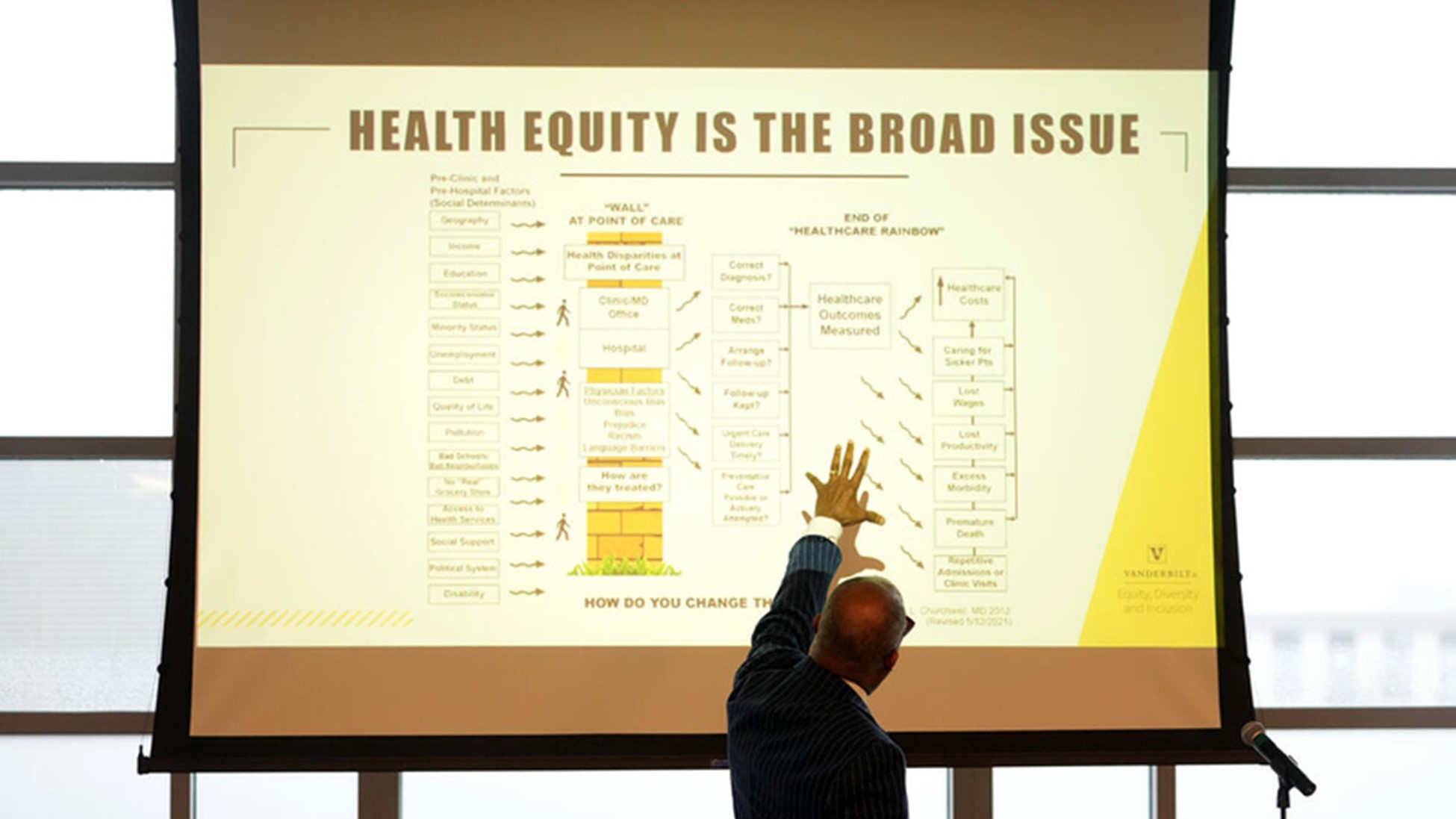
- Division of Government and Community Relations worked with One Generation Away and Second Harvest Food Bank to coordinate a food distribution event that provided food to more than 1,200 local community members. Volunteers came from across the Vanderbilt community, including Next Steps at Vanderbilt, University Staff Advisory Council, Vanderbilt Women’s Club and Vanderbilt University Police Department. Through Vanderbilt’s partnership with One Generation Away, more than 112,000 meals have been distributed to families in need since 2020.
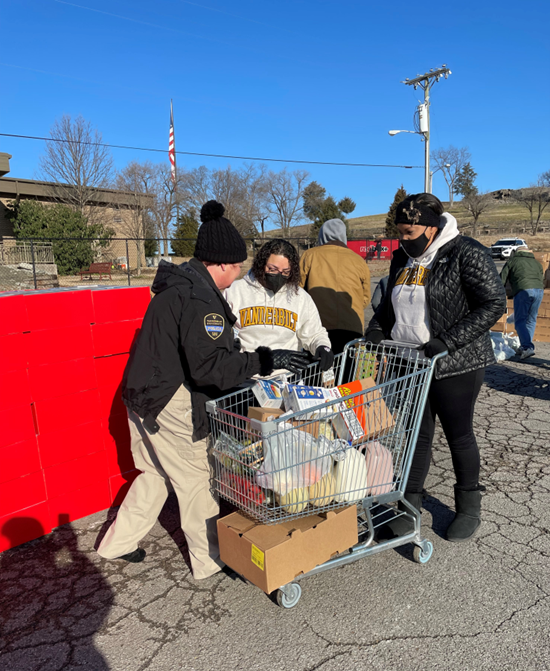
-
Information Technology
- VUIT’s Inclusion and Diversity Advisory Board sponsored several events, including:
- Viewings for the documentary State of Pride and facilitated discussions on the importance of Pride Month.
- Open office hours for VUIT staff to engage iDAB board members in discussions pertinent to equity, diversity and inclusion.
- Visits to several local high schools to promote information technology and build a pipeline of interested young people who may not have had much experience with the field. This included a five-week AWS Cloud Computing Cloud Practitioner training program at Maplewood High School.
- VUIT’s Inclusion and Diversity Advisory Board sponsored several events, including:
-
Communications and Marketing
- Increased efforts to streamline communication of EDI efforts across campus by working with Vanderbilt University Communications and Marketing, including:
- Increased communications on social media and other platforms, including social media takeovers aimed at community building and collaboration on EDI efforts.
- Published 105 diversity-related stories. Stories highlighted Vanderbilt’s initiatives, research and community efforts to foster a more inclusive and welcoming community.
- Prioritized diversity and inclusion messaging in communications from university leadership and launched a university-wide item about the brand identity refresh, which clearly articulates our values and beliefs, emphasizing the importance of belonging and inclusivity.
- Increased efforts to streamline communication of EDI efforts across campus by working with Vanderbilt University Communications and Marketing, including:
Colleges and Schools
-
Arts and Science
- In partnership with the Divinity School, the College of Arts and Science launched the James Lawson Institute for the Research and Study of Nonviolent Movements. The Rev. James Lawson returned to Vanderbilt to help launch the institute. A&S will be involved in programming throughout the coming academic year.
- The Program in Climate and Environmental Studies launched a new, innovative and highly interdisciplinary major in Climate Studies, the subject of which highlights significant racial, social and economic disparities. The major, one of the first of its kind, presents a comprehensive perspective on climate change, integrating the natural sciences, social sciences and humanities.
- The school continued to support the Grand Challenge Initiative on Climate and Society, which addresses climate change from multiple angles, including through the lens of global justice.
- The Learning Assistant Program was expanded through the HHMI Inclusive Excellence 3 initiative, which aims to increase equity in the introductory STEM experience using an achievement-oriented framework. The program is now offered in five courses.
- The Department of Psychology launched an undergraduate summer research training program in psychology targeted toward underrepresented minorities.
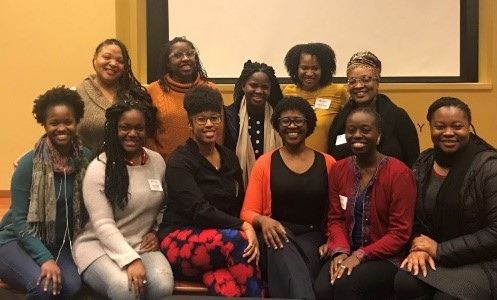
Members of STEM Sistahs gathering for a group photo during an event. - Continued the STEM Sistah Network, which provides intersectional mentoring and support to Black women graduate students in pursuit of STEM degrees and the professoriates. This initiative is funded by a TIPS VRA, and Renã Robinson (chemistry) and Christy Erving (sociology) serve on the leadership team.
- Of the 30 tenure/tenure-track faculty members recruited in 2021-22:
- 17 are women (57 percent)
- Of those 17, six were hired in STEM fields (35 percent)
- 16 are faculty of color (53 percent)
- Seven are underrepresented minorities (23 percent)
- Kirsty Clark (Medicine, Health and Society and LGBTQ+ Policy Lab) forged a formal research-community partnership with the Oasis Center, the largest LGBTQ+ youth-serving organization in Middle Tennessee, through grant funding from the Vanderbilt Institute for Clinical and Translational Research.
-
Blair School of Music
- Launched inaugural summer camp MusicTech, engaging area students with full scholarships, providing campers from diverse backgrounds the opportunity to learn to compose original game music alongside like-minded technologists and industry experts.
- Sponsored a conversation with author, curator and independent scholar Maxine Gordon, who is also the widow of jazz legend Dexter Gordon. Gordon discussed her book, Sophisticated Giant: The Life and Legacy of Dexter Gordon. The event had a repeat in collaboration with the National Museum of African American Music as part of their “Sips and Stanzas” series.
- Vanderbilt Opera Theatre offered special programming to the diverse Nashville community:
- Lucinda y las Flores de la Nochebuena, an English-Spanish Christmas children’s opera written by Blair professor and alumnus Joshua McGuire and Blair alumnus Evan Mack, with performances offered at Casa Azafrán
- Monkey and Francine in the City of Tigers, which fuses tales from India, China and West Africa and was performed al fresco at the Nashville Zoo
- Vanderbilt Opera Theatre offered special programming to the diverse Nashville community:
- Participated in the instrumental ensemble project Orquesta VenezolanAmericana de Vientos – Encuentro Colombiano, which is funded by a U.S. Department of State grant. The weeklong program involved collaborating with university students and teaching younger students at a local school, followed by an instrument drive for the students in Colombia.
-
Divinity School
- The Henry Luce Foundation graciously extended their initial three-year grant commitment to the Public Theology and Racial Justice Collaborative to mobilize our previous work with summer institutes in a shortened version around the nation. Our target was to produce mobile institutes in places principally where our cohort members live and serve. With the advent of COVID-19 pandemic travel limitations, our mobile institutes were confined largely to virtual events. Our goal for the academic year was to complete the online courses with students and other curators and to complete all planned mobile institutes. We produced 11 mobile institutes in eight states and online.
- Included a voluntary question on our enrollment application about gender identity, allowing better understanding of the gender diversity of the applicant pool and incoming students.
- Offered travel stipends to all prospective master’s degree students, hoping to make it possible for prospective students with less privileged financial backgrounds to visit.
- Assistant Dean of Admissions, Vocation and Stewardship Laura Cheifetz worked with the AAPI employee affinity group and with multiple organizations across campus (LGBTQI Life, EDI, etc.), including in Divinity (PTRJ, CTP) to bring journalist, author and activist Helen Zia to campus to speak and meet with students.
- Offered webinars that focused on the social responses to historical trauma, including slavery, Jim Crow and the “New Jim Crow” of racialized mass incarceration in the U.S. through the Cal Turner Program for Moral Leadership’s 2021 initiative, #WTF (What’s to Forgive?).
- The Carpenter Program in Religion, Gender and Sexuality sponsored the second iteration of the LGBTQ Faith and Public Policy Cohort (now Queer Faith, Public Policy and Liberation Cohort), led this time by VDS students Danielle Garrett and Sir Cole Chambers, MDiv’22. The cohort prepares students to advocate for LGBTQIA issues in the public sphere in a deeply intersectional way. This year, it focused particularly on helping participants connect advocacy to vocation in a variety of ways by connecting them to VDS alums (and others) doing the work in a variety of contexts.
- Associate Dean Ellen Armour served as faculty sponsor and host for Fulbright Scholar Tabona Shoko of the University of Zimbabwe, who came to VDS because he saw the school as a world leader in education around LGBTQIA issues and religion. His research was focused particularly on curricular issues that could be useful to his home institution.
- The James Lawson Institute for the Research and Study of Nonviolent Movements hosted multiple film screenings, forums, panels and other events covering nonviolence, immigration, voting rights, civil rights and the Jan. 6, 2021, insurrection. JLI also collaborated with the Youth Advisory Council, bringing together teenagers and their parents to discuss how to create change in youth spaces.
- The Wendland-Cook Program in Religion and Justice launched Solidarity Circles, diverse peer networks of faith leaders, organizers and clergy interested in the solidarity economy in the South, to work on intersectional issues such as racial justice, economic justice, gender justice and environmental justice.

-
School of Engineering
- During summer 2022, VUSE offered the on-campus residential summer bridge initiative named Fall Early Start Transition (FESTival) program. The goal of the program is to build community for our underrepresented minority and first-generation students as well as strengthen STEM concepts for successful academic progress in the first year of college. This program directly addresses academic preparation and eases the transition from typically under-resourced backgrounds to college. Students attended class in math, chemistry, computer science and engineering each day. Tutoring and group work were also required in the evening hours. In addition, one hour each day was devoted to professional development to give students tools on how to be successful. A percentage of these students is part of the incoming Clark Scholars cohort. This scholarship program, now in its fifth year, focuses on first-generation, under-represented minorities and women in engineering. The Clark Foundation partially funded the FESTival program and may extend support to continue the program for the foreseeable future. Ten Clark Scholars were able to meet students like them, expanding the number of people they know when they arrive on campus. We had 22 students participate this past summer, half of whom were women.
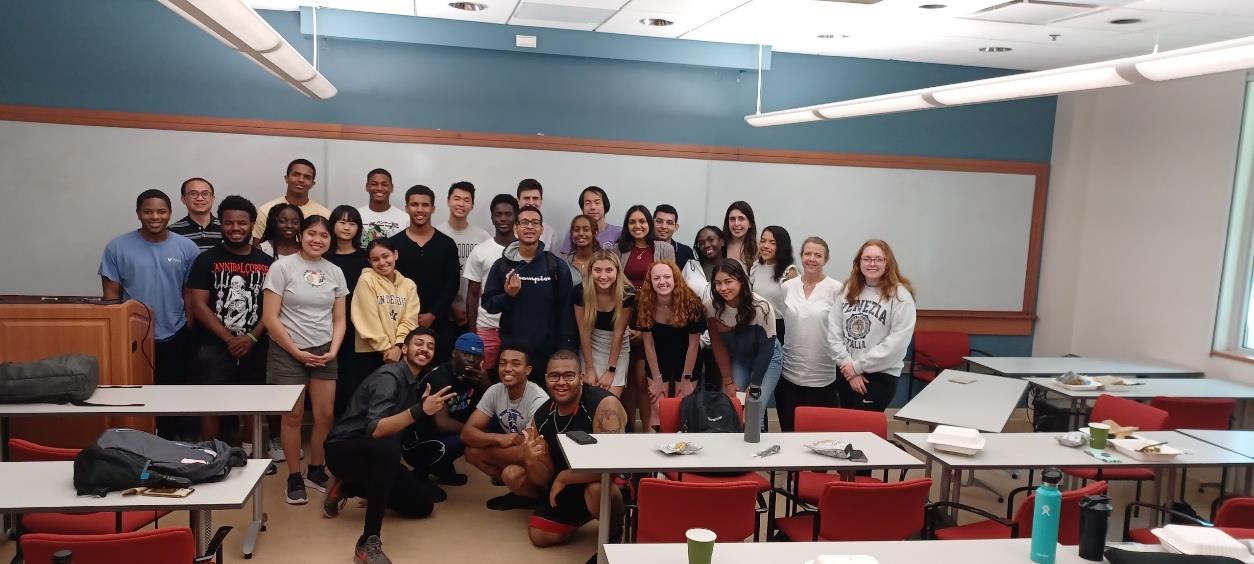
- VUSE graduate STARTS (Strategic Transitioning for Academic Research, Training and Success) program is designed to give incoming first-year doctoral students a successful start to their academic career. The pilot of the program was launched summer 2022. Speakers from across campus—STEM librarians, Career Center, Center for Student Wellbeing, Graduate & Postdoc Academic Success—came together to make the program a great training and resource for incoming graduate students.
- The Vanderbilt School of Engineering’s Frist Center for Autism and Innovation, working in partnership with Fisk University, has won a $1.9 million grant from the National Science Foundation to create a system of programs to support neurodiverse students in engineering majors and careers.
- Of the 331 incoming VUSE students for the Class of 2026, 50.7 percent are female, and 23 percent are from underrepresented minority groups.
- Increased women faculty by inviting three new women faculty: Professor Dan Lin, Associate Professor Pamela Wisniewski and Assistant Professor Andrea Locke. This increases women faculty representation to 21 percent.
- Continued the Emerging Scholars in Engineering lecture series, which aims to showcase early career academics from underrepresented groups in engineering who are nearing completion or who have completed a doctoral degree or postdoc. Visits are organized to simulate the experience of a faculty job interview and culminate with structured feedback. This lectureship serves a crucial professional development role by providing an insider perspective on the faculty hiring process.
- During summer 2022, VUSE offered the on-campus residential summer bridge initiative named Fall Early Start Transition (FESTival) program. The goal of the program is to build community for our underrepresented minority and first-generation students as well as strengthen STEM concepts for successful academic progress in the first year of college. This program directly addresses academic preparation and eases the transition from typically under-resourced backgrounds to college. Students attended class in math, chemistry, computer science and engineering each day. Tutoring and group work were also required in the evening hours. In addition, one hour each day was devoted to professional development to give students tools on how to be successful. A percentage of these students is part of the incoming Clark Scholars cohort. This scholarship program, now in its fifth year, focuses on first-generation, under-represented minorities and women in engineering. The Clark Foundation partially funded the FESTival program and may extend support to continue the program for the foreseeable future. Ten Clark Scholars were able to meet students like them, expanding the number of people they know when they arrive on campus. We had 22 students participate this past summer, half of whom were women.
-
Graduate School
- Academic year 2021–22 brought significant advancements in financial support for all Vanderbilt doctoral students, to not only recruit a diverse and exceptional incoming Ph.D. cohort, but to bolster all students’ sense of belonging and reduce financial barriers to success. Notable among these financial enhancements are the below initiatives:
- Beginning in July 2022, all newly enrolled Ph.D. students received a one-time Launching Student Success Stipend of $2,000 to help them prepare for the upcoming academic year. The Graduate School, Office of the Provost and the schools and colleges partnered on this financial support mechanism, setting Vanderbilt apart from its peers in start-up support for all incoming doctoral students.
- Students graduating in May 2022 and walking in graduation on May 13 received a $200 regalia reimbursement.
- Beginning April 2022, schools and colleges with Ph.D. programs received funding from the provost and the Graduate School to support doctoral student research and travel. Together, funds were provided to assist more than 235 students to advance their research by attending conferences, visiting labs for training or doing fieldwork.
- The Graduate School Honors Fellowships will be paid in a lump sum at the start of each semester to Ph.D. students, thereby giving increased flexibility to students to use the funds to best support their needs.
- Offered a variety of professional development opportunities for students to hone their academic skills, expand their professional networks and ultimately be positioned for placement in leadership opportunities to solve the world’s greatest challenges after graduation. These included a virtual SEC Emerging Scholars networking and career fair, career colloquiums and a 12-week training by the National Center for Faculty Development and Diversity, which provided accountability and productivity tracking to help Ph.D. students establish daily writing habits.
- Increased support for international graduate students through a close partnership with the schools and colleges and International Student and Scholar Services. Outcomes of these efforts include:
- Office of Postdoctoral Affairs planning a variety of programs for international postdocs.
- Partnering with the university registrar to create an objective framework to review and evaluate requests for Classification of Instructional Program code changes to ensure a credible, equitable outcome for international students.
- Co-sponsored a discussion with Dr. Joseph L. Brown of Stanford University on stereotype threat in academia.
- As of July 5, 2022, foreign national admissions (620) and acceptances (208) are up 29 percent and 20.2 percent, respectively, with the highest gains at the master’s level.
- Academic year 2021–22 brought significant advancements in financial support for all Vanderbilt doctoral students, to not only recruit a diverse and exceptional incoming Ph.D. cohort, but to bolster all students’ sense of belonging and reduce financial barriers to success. Notable among these financial enhancements are the below initiatives:
-
Law School
- Launched the 1Levate Mentorship Program, a highly selective mentorship program designed to develop leadership skills for students from underrepresented communities.
- Conducted an extensive search for outstanding faculty specializing in a range of subjects, including social justice and race and the law. As part of this search, VLS faculty participated in interviewing a large slate of extraordinary candidates at the junior untenured and the senior tenured levels.
- Implemented changes to the competition to join VLS law journals, as indicated by the 2020 report, which highlighted problems with journal participation and specifically noted low rates of participation by students of color and public interest–oriented students, resulting in a marked increase in underrepresented student participation.
- Curricular changes to the study of constitutional law as a way to create pathways for students to gain a broad education in civil rights, nondiscrimination and racial justice. Faculty approved modifications to ensure deeper learning on the 13th, 14th and 15th Amendments—“the Reconstruction Amendments”—that set in motion a rights-based transformation of the country.
- Administration and Black Law Students Association collaborated on increased programming for Black History Month, showcasing conversations on Black and Jewish solidarity in civil rights, environmental justice, entertainment and intersectionality, as well as careers.
- Continued community enrichment through the Dean’s Lecture Series on Race and Discrimination and the Book and Film Club on Racial Justice.
- Ensured that incoming students are welcomed in their first few weeks to a school that is vocal about its commitment to the values of belonging, anti-racism and nondiscrimination. All students received a copy of I’ll Take You There: Exploring Nashville’s Social Justice Sites, engaged in discussions around How to Have Difficult Conversations and received insights in community-building from the University Counseling Center.
-
School of Medicine
- The School of Medicine continues to provide anti-racism, microaggression and active bystander training to all students. These efforts are strengthened by student input and leadership within the trainings.
- The Office for Health Equity continues to provide opportunities for students to learn and develop skills to become leaders for change and more equitable health care. This year, 11 medical students graduated with a Certificate in Health Equity in addition to their doctor of medicine degrees.
- The Racial Equity Plan has been released and outlines goals, actions, accountability and milestones for advancing racial equity at VUMC and VUSM. This plan was developed from recommendations submitted to the dean by the Racial Equity Task Force. The task force comprised medical students, faculty members and staff members charged with identifying key steps to eliminating racism at VUMC.
-
School of Medicine Basic Sciences
- Made a substantial financial investment in the creation of multiple spaces, including two new lactation rooms and three communal spaces in Medical Research Building III, one of which includes a library with books on various EDI topics that are available to everyone. There is also a new space for Initiative for Maximizing Student Development that includes a kitchen, office and conference room allowing space to work, relax and eat, and it encourages community building in the process.
- Offered new programming centered around issues of EDI:
- “Juneteenth: A Freedom Celebration” featured a diverse selection of African American researchers in Basic Sciences, including graduate students, postdocs and faculty members, with a goal of offering the event annually.
- “Everybody Fails: Finding Your Own Path to Academic Success” was a panel comprising well-established Vanderbilt faculty members that discussed moving beyond setbacks and remaining focused on scientific pursuits in the face of challenges.
- “Straight Facts” about LGBTQI Life in collaboration with the Office of LGBTQI Life.
- “DEI & Donuts,” a monthly discussion open to all trainees, postdocs and faculty to discuss DEI topics as they relate to academia while building community.
- Vanderbilt Institute for Infection, Immunology and Inflammation (VI4) hosted a workshop for faculty in partnership with the Office for EDI called “The Heart, Head and Hand Work of Diversity, Equity and Inclusion.”
- A 21-day equity challenge for trainees, faculty and staff to stimulate and further discussions on racial equity in the United States.
- Vanderbilt Integrated Training Alliance Symposium invited underrepresented graduate trainees to give research talks and receive mentoring over two days.
- Vanderbilt Brain Institute created a student-initiated newsletter to promote community and acknowledge EDI efforts.
-
School of Nursing
- Restructured the dean’s executive leadership team and realigned reporting structure to have Associate Dean for EDI Rolanda Johnson report directly to the dean.
- Offered new programming centered around issues of EDI:
- Solidarity for Social Justice event, during which SON community members held individually designed signs declaring, “I STAND for (person, place or thing)” as a demonstration of VUSN’s continued commitment to social justice broadly and in health care.
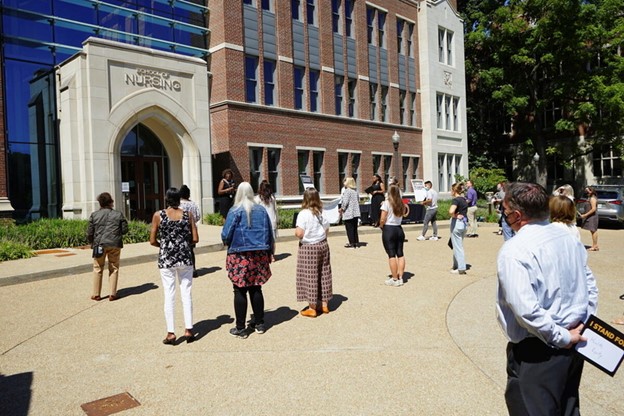
Students, faculty and staff gathered outside the School of Nursing to participate in the Solidarity for Social Justice event. - Mandatory equity, diversity and inclusion video-based simulations for faculty and staff, with participation from 100 percent of staff and 95 percent of all faculty.
- “COVID Perspectives, Values and Vaccination Hesitancy,” a panel of public health and prevention experts, discussed the complexities of personal and professional communication with individuals who are hesitant or refuse to be vaccinated against COVID-19.
- Solidarity for Social Justice event, during which SON community members held individually designed signs declaring, “I STAND for (person, place or thing)” as a demonstration of VUSN’s continued commitment to social justice broadly and in health care.
- Continued standing programming to promote EDI:
- Dean’s Diversity Lecture Series combined with the Leadership Lecture Series to host “A Conversation with Congresswoman Lauren Underwood.”
- The Dean’s Diversity series was established in 2016. It explores the diversity of backgrounds, cultures, ideas and viewpoints in our world today. It seeks to equip students, faculty, staff and other community members with the knowledge and understanding needed to lead nursing forward. Throughout the 2021–22 academic year, the Dean’s Diversity Lectures served as opportunities to extend dialogue about health inequities and disparities.
- VUSN ’Dores Act Campaign is aimed at promoting inclusivity. Faculty and staff were challenged to implement at least four inclusive acts that promote thoughtfulness, a sense of belonging or inclusivity and were required to attend a minimum of two VUSN educational inclusivity activities.
- “Unraveling Social Injustice, Let’s Talk About It” Literacy Group discussed The Underground Railroad by Colson Whitehead and So You Want to Talk About Race by Ijeoma Oluo, among others.
- Diversity Month 2022 brought together student affinity groups to sponsor lectures and activities. Programming covered topics such as prescribing PrEP, intercultural competency, climate change and social justice, health disparities in the AAPI community and others.
-
Owen Graduate School of Management
- Welcomed Natasha Ovuoba to the newly created position of director of equity, diversity and inclusion; she will support Owen’s Diversity and Inclusion Advisory Board and overall EDI efforts.
- Conducted a yearlong learning theme on culture, including speakers, panels, discussions, surveys and focus groups.
- Developed “Owen Essentials,” six culture principles that put the Vanderbilt Way into practice: Trust, Transparency, Accountability, Inclusiveness, Collaborative Community, and Innovation & Learning.

- Hosted distinguished speakers to address culture and inclusion, including:
- Robert Lawrence Wilson (senior partner, Culture Shift Team)
- Mimi Vaughn (CEO, Genesco Inc.)
- Stuart Kaplan (director of culture transformation, Google Cloud)
- Continued CARE (Communicate, Acknowledge, Respect, Educate), a website and newsletter that reflects Owen’s commitment to fostering a safe, healthy and well-informed community and serves as a resource for faculty, staff and students to enhance well-being, combat systemic racism and pursue equity, diversity and inclusion at Owen.
- Launched the Inclusive Conversation Series to give staff a safe space for sharing as well as develop individual skills in having meaningful and sometimes challenging conversations with a goal of building connections, breaking silos and encouraging listening and understanding of different perspectives and voices.
- Worked through our Center for Social Ventures and expanded Board Fellows Program to support organizations that address Nashville racial inequality.
-
Peabody College
- Launched Nashville Partnership for Education Equity Research, a partnership between Peabody College and Metro Nashville Public Schools aimed at strengthening education equity in Nashville with a goal of producing actionable, innovative and scalable research to address racial and social inequities in preK-12 schools.
- Awarded 16 EDI Small Grants (nine program grants and seven research-focused grants), including supporting professors Kelly Slay and Joanne Golann’s writing group for graduate women of color, the creation of a mentoring program for SPED professional students and several programs offered by the Peabody student group APIDA (Asian Pacific Islander Desi American).
- Hosted the inaugural Peabody Diversity Summit to bring together faculty, students and staff doing EDI work to build community, offer opportunities for peer collaboration and learning and build capacity to engage in equity and inclusion work across the college.
- Offered programming centered around issues of EDI:
- Screening of By Design: The Shaping of Nashville’s Public Schools, a documentary produced by the Nashville Public Education Foundation examining historical moments of public schooling in Nashville dating back to the 1800s. The screening was followed by a panel of local leadership from MNPS and Vanderbilt.
- Book talk around Cynthia Dillard’s The Spirit of Our Work: Black Women Teachers (Re)member, which engaged students, faculty, staff and community members.
- Collaborated with Peabody Career Services to create a series of programs to address issues of identity when conducting a career search.
- Lunch and Learn centered on Nicole Joseph and Cynthia Chapple’s new research practice partnership funded by a Peabody Small Grant.
- Webinar on Moving Beyond Land Acknowledgements and Token Representations, followed by a lunch and learn to discuss.
- Peabody held an Iftar meal during Ramadan to highlight and celebrate Muslim students’ experiences in a communal gathering for the college.
- Launched Mentoring and Learning Together, a mentorship group for junior and senior faculty of color to share success and failures and to network and exchange critical information about how to survive as a person of color in academics.